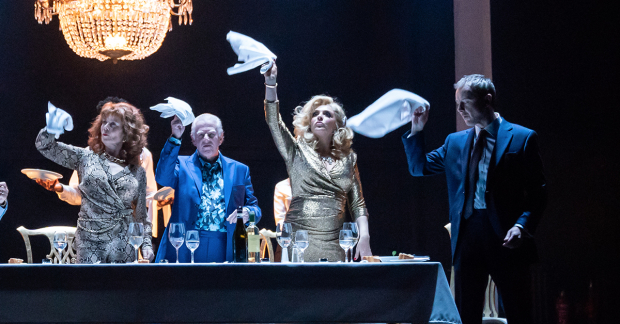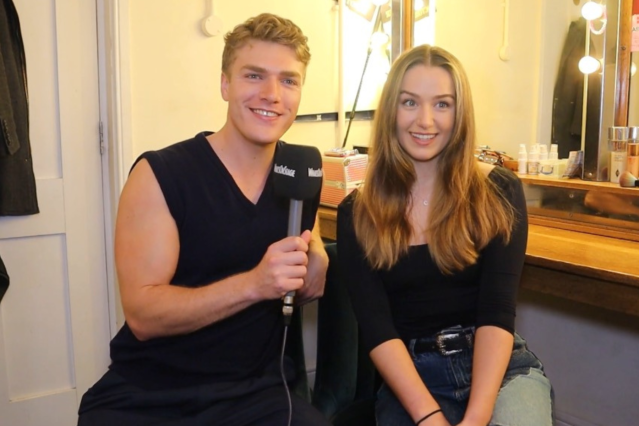Review: Pinter Six Party Time / Celebration (Harold Pinter Theatre)
This double-bill of plays is directed by Jamie Lloyd as the Pinter at the Pinter season continues in the West End

© Marc Brenner
The passage of time allows a new view of the late plays of Harold Pinter. When Party Time (1991) and in particular Celebration (his last stage play from 2000) first appeared, I remember thinking they were fun but a bit crude and shouty, not quite worthy additions to his distinguished and resonant oeuvre.
Now they look less fantastical and more prescient – fierce, angry satires of the super-rich, privileged upper echelon, propelled by greed and exclusivity, that has effortlessly torn the liberal consensus of a caring society apart. Pinter's essential contention that the Western democracies are just as much prey to the instincts of totalitarianism as any society that loses track of the suffering of others seems uncomfortably close to the world we see around us.
It helps that here, in the sixth bill of Jamie Lloyd's Pinter at the Pinter season, which stages all the playwright's shorter works, they are given Rolls Royce productions of clarity and intelligence by an exceptional cast who, across both plays, seize on their rich caricatures like lions on raw meat.
Lloyd as director has chosen to underline Party Time's operatic qualities, stylising its depiction of a powerful group of men and women meeting to drink and be merry as mayhem threatens the streets outside their sheltered privilege. As the curtain rises, they sit in a row on chairs like thrones, glasses raised, stepping forward to crow about the amazing club they have all joined. "You won't find voices raised in our club," says Terry, played with glowering, charming menace by John Simm. "People don't do vulgar and sordid and offensive things. And if they do, we kick them in the balls and chuck them down the stairs with no trouble at all."
The metaphorical impact of that club, its power to shut out and suppress all opposition peeks through every line of the play: from the way Eleanor Matsuura's increasingly distraught Dusty is brutally and contemptuously silenced every time she asks about the fate of her brother Jimmy; from the suggestion of the powerful Gavin (Phil Davis) that after a "bit of a round-up" normal service will be imposed. "We insist upon it." But it is there too in the way that Katherine Kingsley's fixed smile as her husband (Ron Cook) describes their unequal relationship can't quite distract from the hand that shakes on her glass.
Unsettling and queasy, the play is full of haunting images of power misused. Its ending, when we finally meet Jimmy, is perhaps a little too obvious, but it leaves a lingering sense of unease, of the darkness dwelling beneath an apparently civilised veneer.
Celebration is lighter in tone and in design – Soutra Gilmour dresses the women in glittering gold, the men in shiny suits – but there's no mistaking the threat beneath the conspicuous consumption as two brothers married to two sisters celebrate a wedding anniversary in a swish eaterie, home of fine dining. Their brash, boastful revels are interrupted by the musings of another couple – a banker and his wife – and by the staff including a waiter whose grandfather has apparently met every literary, political and filmic figure of significance in the 20th century.
Theatre conventions have subtly altered since the play first appeared and so has our understanding of Pinter's treatment of female characters. What's fascinating in these two plays, particularly in Celebration, is the way that the production shines a light on the way women are the victims of male threat but retain their power; the behaviour of the men is thrown into relief by their response.
Tracy-Ann Oberman and Celia Imrie have wonderful fun as the predatory, knowing sisters all big hair and disaffection; Kingsley, as Suki the former secretary married to Simm's chilly banker shimmers with disdain. The impact she brings to the line "I've been behind a few filing cabinets ..In my time" is both sultry, comic and full of powerful malice. It's a wonderful performance.
But everyone is excellent from Cook and Davis' gangster brothers, revelling in the effect of fine dining, to Gary Kemp's smarmy maitre d', to Abraham Popoola's charismatic waiter, making his interjections to tell of his grandfather's mythical life, and finally reminding everyone that there is another way to live.





















